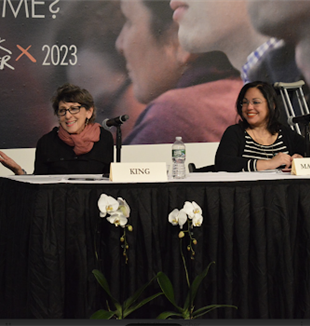
You Cannot Love What Shocks You
With the desire to go deep into the meaning of suffering, Stephanie reflects on the New York Encounter’s panel on the new book Cry of the Heart.I attended the panel discussion entitled “You Cannot Love What Shocks You” for three reasons: Because a friend was participating in the panel, to hear anecdotes of the inimitable Lorenzo Albacete by people who knew him personally, but mainly because this past year the meaning of suffering became more of a question for me.
What I experienced was not the catastrophic suffering of those trying to survive in a war zone, nor was it caused by grave illness or profound poverty, but it was my suffering. It consisted of the day-in-day-out trials of raising five children while enduring nausea for months due to another pregnancy. Once the nausea subsided, I went through more weeks of sickness. During those days and weeks, when so often my family would find me laying on the couch or in bed, I suffered not only physical pain and fatigue, but the sacrifice of not – as I saw it – being able to do what I needed to do. I had to relinquish control over the things that happened at home and through it all, I often felt that I was letting people down, especially my husband and kids. “Why?” I demanded. “Why do I have to suffer this?”
"Suffering is the consciousness of pain, the kind of knowing that generates the question ‘why?’ … If we ask why, it means that we have some idea of how it should be and something has occurred that doesn’t fit that worldview … Thus suffering makes us go beyond our preconceived worldview towards something more, and that’s the first challenge — to try to find an answer in something more.” (From the recently released book Cry of the Heart by Lorenzo Albacete)
I don’t find myself on the other side of what I suffered with an answer to this question, but I am more aware of suffering as a reality in my life and in the lives of others. In a way, I am beginning to have a greater respect for it because it is becoming clear that suffering comes with a call. While I am barely beginning to grasp this, Albacete was certain of it. “Albacete did not rescue you from your suffering,” Camil said at the start of the event, “he accompanied you in it.” And this was because he understood that “suffering is a call from God to be treated delicately, not to be avoided.” This is a fascinating gaze on suffering, one that I want to become habitual in me.
As I heard more about Albacete and his experience of suffering, I noticed in myself a new urgency to better accompany those close to me who are suffering. In fact, as the Albacete event was taking place, a good friend of mine was unable to attend that event (and several others that morning) because of a sudden medical emergency. “I’m so overwhelmed,” she texted. Immediately, I perceived that call. I offered to come and be with her while normally I would have said something like, “I’m so sorry!” I didn’t suddenly become a better, more altruistic person, but I could recognize that while I attended one kind of event, another event, one that wore the face of suffering, was simultaneously taking place in my friend’s life. I wanted to be there for it in whatever way I could.
During the talk, this accompaniment of someone who is suffering was referred to as “co-suffering.” My eyes are more open now to the many precious opportunities that I am given to co-suffer with others; from a friend grieving the end of a relationship, to my toddler who cries when he falls and gets hurt.
God is so tender in giving us the witness of Lorenzo Albacete, through the stories his friends share about him and through his writings, as someone to follow on our human journey. We don’t have to understand suffering, we can instead look to Lorenzo who shows us how to suffer, all the while assuring us that to suffer is to draw closer to Christ, and all the while cracking a few jokes.
Stephanie, Crosby, MN